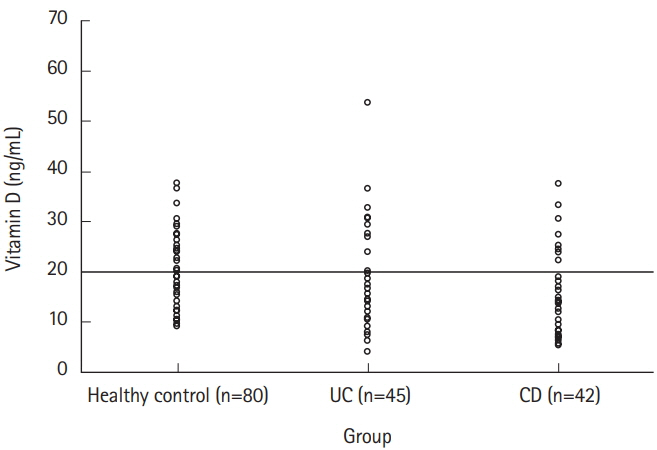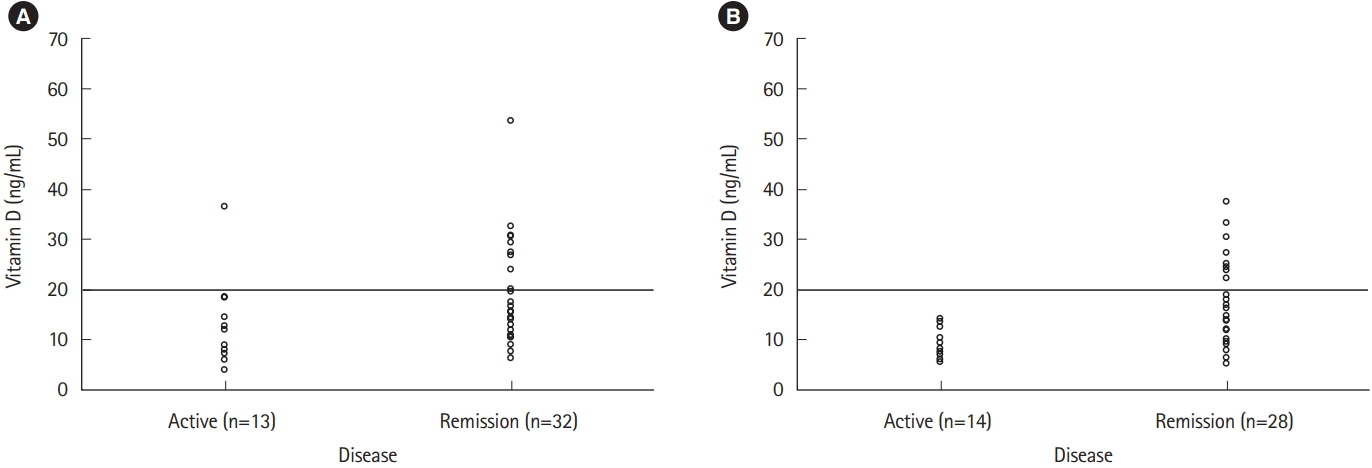Intest Res.
2019 Jan;17(1):70-77. 10.5217/ir.2018.00022.
Vitamin D deficiency is associated with disease activity in patients with Crohn’s disease
- Affiliations
-
- 1Department of Internal Medicine, Seoul Paik Hospital, Inje University College of Medicine, Seoul, Korea. yousunk69@korea.com
- KMID: 2438445
- DOI: http://doi.org/10.5217/ir.2018.00022
Abstract
- BACKGROUND/AIMS
Previous data suggest that vitamin D has a significant role in inflammatory bowel disease (IBD). We investigated the incidence of vitamin D deficiency in Korean patients with IBD and the correlation between serum vitamin D level and disease activity.
METHODS
We retrospectively analyzed the medical records of patients with IBD whose serum vitamin D levels were checked. Deficiency of 25-hydroxyvitamin D was defined as < 20 ng/mL. Disease activity was evaluated using the partial Mayo score for ulcerative colitis (≥2 defined as active disease) and Harvey-Bradshaw index for Crohn's disease (≥4 defined as active disease).
RESULTS
We enrolled 87 patients with IBD (ulcerative colitis [UC], 45; Crohn's disease [CD], 42). Among them, 65.5% (57/87) were men, with a mean age of 44.9±15.1 years (range, 18-75 years). The mean duration of disease was 4.7±4.8 years (range, 0.1-17.1 years). Vitamin D deficiency was found in 73.6% (64/87) of patients with IBD. Patients with IBD (mean vitamin D level, 16.3±9.0 ng/mL) showed lower vitamin D level than the healthy control group (mean vitamin D level, 20.4±7.0 ng/mL), with no statistically significant difference (P=0.136). Disease activity was inversely correlated with vitamin D deficiency in patients with CD (P=0.007). However, no correlation was observed in patients with UC (P=0.134).
CONCLUSIONS
Approximately 75% of Korean patients with IBD showed vitamin D deficiency state. Vitamin D deficiency is associated with disease activity, particularly in patients with CD.
MeSH Terms
Figure
Cited by 3 articles
-
Inflammatory Bowel Disease and Vitamin D
Ki Bae Kim, Hyoung Woo Kim, Jun Su Lee, Soon Man Yoon
Korean J Gastroenterol. 2020;76(6):275-281. doi: 10.4166/kjg.2020.160.Can vitamin D supplementation help control inflammation in inflammatory bowel disease beyond its classical role in bone health?
Sung Wook Hwang
Intest Res. 2019;17(2):157-159. doi: 10.5217/ir.2019.00038.Evaluation of nutritional status using bioelectrical impedance analysis in patients with inflammatory bowel disease
Seung Hyuk Kim, You Sun Kim, Si Hyeong Lee, Hyun Mi Lee, Won Eui Yoon, Seo Hyun Kim, Hee Jun Myung, Jeong Seop Moon
Intest Res. 2022;20(3):321-328. doi: 10.5217/ir.2021.00022.
Reference
-
1. Molodecky NA, Soon IS, Rabi DM, et al. Increasing incidence and prevalence of the inflammatory bowel diseases with time, based on systematic review. Gastroenterology. 2012; 142:46–54. e42.
Article2. Ng WK, Wong SH, Ng SC. Changing epidemiological trends of inflammatory bowel disease in Asia. Intest Res. 2016; 14:111–119.
Article3. Loftus EV Jr. Clinical epidemiology of inflammatory bowel disease: incidence, prevalence, and environmental influences. Gastroenterology. 2004; 126:1504–1517.
Article4. Yoon SM. Micronutrient deficiencies in inflammatory bowel disease: trivial or crucial? Intest Res. 2016; 14:109–110.
Article5. Huang S, Ma J, Zhu M, Ran Z. Status of serum vitamin B(12) and folate in patients with inflammatory bowel disease in China. Intest Res. 2017; 15:103–108.
Article6. Shin IS, Seok H, Eun YH, et al. Wernicke’s encephalopathy after total parenteral nutrition in patients with Crohn’s disease. Intest Res. 2016; 14:191–196.
Article7. Sadeghian M, Saneei P, Siassi F, Esmaillzadeh A. Vitamin D status in relation to Crohn’s disease: meta-analysis of observational studies. Nutrition. 2016; 32:505–514.
Article8. Siffledeen JS, Siminoski K, Steinhart H, Greenberg G, Fedorak RN. The frequency of vitamin D deficiency in adults with Crohn’s disease. Can J Gastroenterol. 2003; 17:473–478.
Article9. Ulitsky A, Ananthakrishnan AN, Naik A, et al. Vitamin D deficiency in patients with inflammatory bowel disease: association with disease activity and quality of life. JPEN J Parenter Enteral Nutr. 2011; 35:308–316.
Article10. Mouli VP, Ananthakrishnan AN. Review article: vitamin D and inflammatory bowel diseases. Aliment Pharmacol Ther. 2014; 39:125–136.
Article11. Garg M, Lubel JS, Sparrow MP, Holt SG, Gibson PR. Review article: vitamin D and inflammatory bowel disease: established concepts and future directions. Aliment Pharmacol Ther. 2012; 36:324–344.
Article12. O’Sullivan M. Vitamin D as a novel therapy in inflammatory bowel disease: new hope or false dawn? Proc Nutr Soc. 2015; 74:5–12.
Article13. Hart AL. Vitamin D and inflammatory bowel disease: chicken or egg? Inflamm Bowel Dis. 2013; 19:459–460.14. Theodoratou E, Tzoulaki I, Zgaga L, Ioannidis JP. Vitamin D and multiple health outcomes: umbrella review of systematic reviews and meta-analyses of observational studies and randomised trials. BMJ. 2014; 348:g2035.
Article15. Ye BD, Jang BI, Jeen YT, et al. Diagnostic guideline of Crohn’s disease. Korean J Gastroenterol. 2009; 53:161–176.16. Choi CH, Jung SA, Lee BI, et al. Diagnostic guideline of ulcerative colitis. Korean J Gastroenterol. 2009; 53:145–160.17. Vermeire S, Schreiber S, Sandborn WJ, Dubois C, Rutgeerts P. Correlation between the Crohn’s disease activity and Harvey-Bradshaw indices in assessing Crohn’s disease severity. Clin Gastroenterol Hepatol. 2010; 8:357–363.
Article18. Walsh AJ, Ghosh A, Brain AO, et al. Comparing disease activity indices in ulcerative colitis. J Crohns Colitis. 2014; 8:318–325.
Article19. Travis SP, Higgins PD, Orchard T, et al. Review article: defining remission in ulcerative colitis. Aliment Pharmacol Ther. 2011; 34:113–124.
Article20. Best WR. Predicting the Crohn’s disease activity index from the Harvey-Bradshaw Index. Inflamm Bowel Dis. 2006; 12:304–310.
Article21. Harvey RF, Bradshaw JM. A simple index of Crohn’s-disease activity. Lancet. 1980; 1:514.
Article22. Rosen CJ. Clinical practice: vitamin D insufficiency. N Engl J Med. 2011; 364:248–254.23. Torki M, Gholamrezaei A, Mirbagher L, Danesh M, Kheiri S, Emami MH. Vitamin D deficiency associated with disease activity in patients with inflammatory bowel diseases. Dig Dis Sci. 2015; 60:3085–3091.
Article24. Han YM, Yoon H, Lim S, et al. Risk factors for vitamin D, zinc, and selenium deficiencies in Korean patients with inflammatory bowel disease. Gut Liver. 2017; 11:363–369.
Article25. Fu YT, Chatur N, Cheong-Lee C, Salh B. Hypovitaminosis D in adults with inflammatory bowel disease: potential role of ethnicity. Dig Dis Sci. 2012; 57:2144–2148.
Article26. McCarthy D, Duggan P, O’Brien M, et al. Seasonality of vitamin D status and bone turnover in patients with Crohn’s disease. Aliment Pharmacol Ther. 2005; 21:1073–1083.
Article27. Tajika M, Matsuura A, Nakamura T, et al. Risk factors for vitamin D deficiency in patients with Crohn’s disease. J Gastroenterol. 2004; 39:527–533.
Article28. Leichtmann GA, Bengoa JM, Bolt MJ, Sitrin MD. Intestinal absorption of cholecalciferol and 25-hydroxycholecalciferol in patients with both Crohn’s disease and intestinal resection. Am J Clin Nutr. 1991; 54:548–552.
Article29. Kabbani TA, Koutroubakis IE, Schoen RE, et al. Association of vitamin D level with clinical status in inflammatory bowel disease: a 5-year longitudinal study. Am J Gastroenterol. 2016; 111:712–719.
Article30. Garg M, Rosella O, Lubel JS, Gibson PR. Association of circulating vitamin D concentrations with intestinal but not systemic inflammation in inflammatory bowel disease. Inflamm Bowel Dis. 2013; 19:2634–2643.
Article31. Kelly P, Suibhne TN, O’Morain C, O’Sullivan M. Vitamin D status and cytokine levels in patients with Crohn’s disease. Int J Vitam Nutr Res. 2011; 81:205–210.
Article32. Blanck S, Aberra F. Vitamin d deficiency is associated with ulcerative colitis disease activity. Dig Dis Sci. 2013; 58:1698–1702.
Article33. Dumitrescu G, Mihai C, Dranga M, Prelipcean CC. Serum 25-hydroxyvitamin D concentration and inflammatory bowel disease characteristics in Romania. World J Gastroenterol. 2014; 20:2392–2396.
Article34. Frigstad SO, Høivik M, Jahnsen J, et al. Vitamin D deficiency in inflammatory bowel disease: prevalence and predictors in a Norwegian outpatient population. Scand J Gastroenterol. 2017; 52:100–106.
Article35. Raftery T, Merrick M, Healy M, et al. Vitamin D status is associated with intestinal inflammation as measured by fecal calprotectin in Crohn’s disease in clinical remission. Dig Dis Sci. 2015; 60:2427–2435.
Article
- Full Text Links
- Actions
-
Cited
- CITED
-
- Close
- Share
- Similar articles
-
- Hepaplastin test for screen of vitamin K deficiency in term and preterm neonates
- Vitamin D and atopic dermatitis
- Response: Association of Physical Activity and Body Fatness with Vitamin D Deficiency in Older Adults (Korean J Obes 2016;25:24-30)
- Late Hemorrhagic Disease of Infancy
- Letter: Association of Physical Activity and Body Fatness with Vitamin D Deficiency in Older Adults (Korean J Obes 2016;25:24-30)



